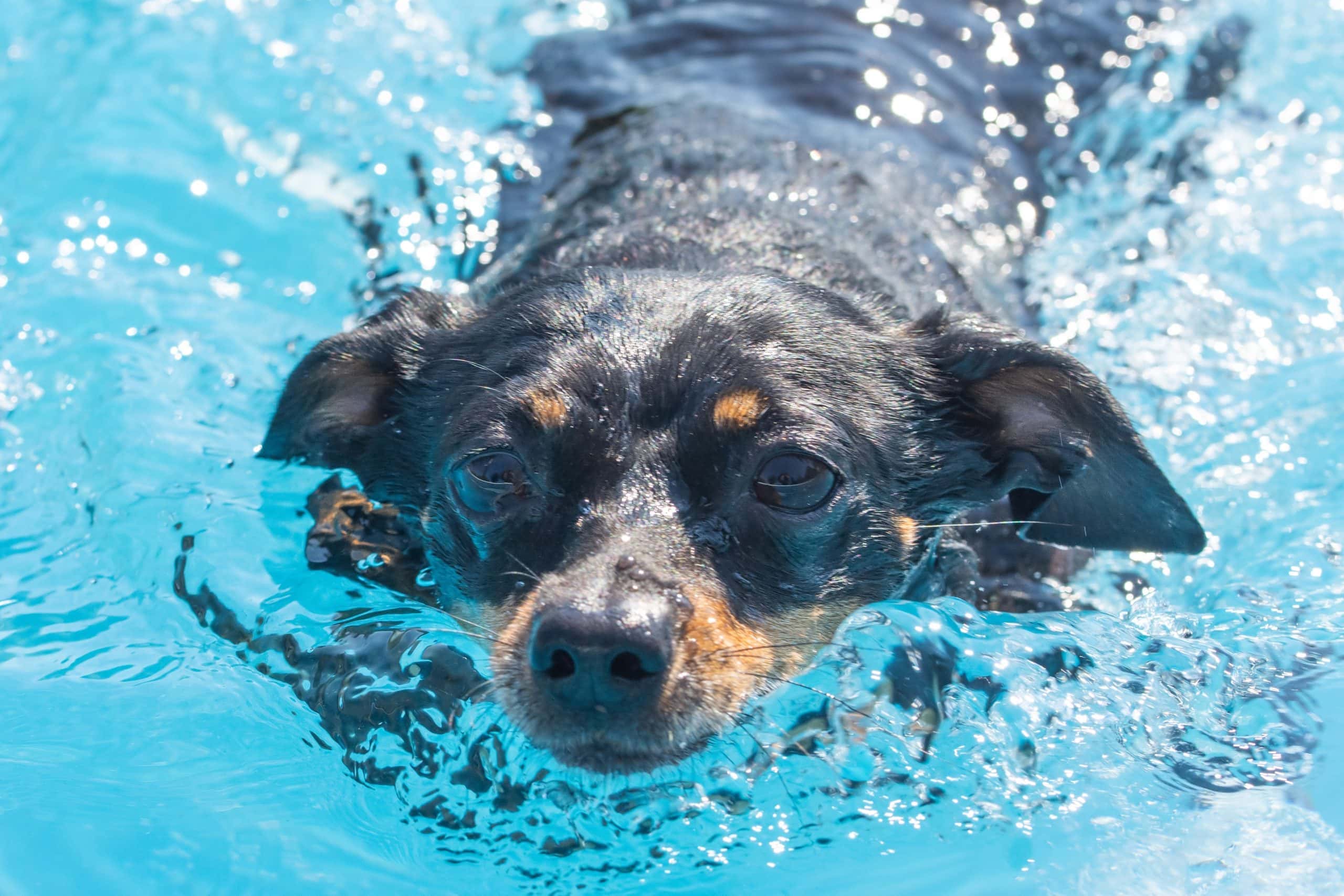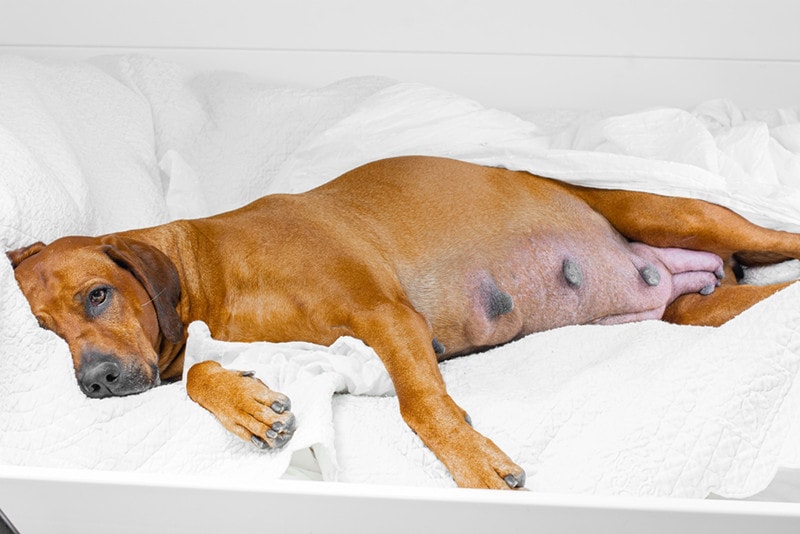King Rat Dog: Info, Pictures, Characteristics & Facts

Updated on

Click to Skip Ahead
The King Rat Dog, a beautiful cross that combines the charm of the Cavalier King Charles Spaniel with the energy of the Rat Terrier, is a relatively rare but fascinating addition to the world of hybrid canine companions. This unique dog showcases the best of both parent breeds, resulting in an intelligent and lively companion that captures the hearts of those fortunate enough to welcome one into their lives.
As a hybrid breed, it may be quite difficult to learn about this interesting dog. But if you’re considering adopting one of these delightful pups, read on as we discuss all you need to know about the relatively uncommon King Rat Dog!
Breed Overview
| Height: | 10–18 inches |
| Weight: | 10–25 pounds |
| Lifespan: | 12–15 years |
| Colors: | Black, white, red, brown, pied |
| Suitable for: | Families and individuals looking for their first pet |
| Temperament: | Quiet, energetic, clingy, loyal, affectionate |
The King Rat Dog is a unique crossbreed that captures the best qualities of both parent breeds — The Cavalier King Charles Spaniel and the Rat Terrier! This fascinating combination results in a companion that is not only elegant and affectionate but also highly agile and intelligent.
The Cavalier King Charles Spaniel, known for its regal appearance and gentle disposition, has roots dating back to the 17th century and was a beloved companion of British nobility. On the other hand, the Rat Terrier, a versatile American breed from the 19th century, was bred for its exceptional hunting and farm dog skills.
The King Rat Dog, a newer breed in the canine world, inherits the grace and sociability of the Cavalier King Charles Spaniel and the agility and prey drive of the Rat Terrier. This mix creates a delightful pet that is not only a loving family member but also a spirited and active partner for those who enjoy outdoor activities and exercise with their furry friends.
King Rat Dogs are known for their sweet and friendly temperament, making them excellent family pets. Their adaptability allows them to seamlessly fit into various family dynamics, making them great with children and adults alike. The King Rat Dog’s loving nature and affectionate disposition ensure that they quickly become an integral part of any family, bringing joy and companionship to their human counterparts!
King Rat Dog Breed Characteristics
King Rat Dog Breed Puppies
As a hybrid breed, finding a King Rat Dog may require some patience and research due to their relatively rare status. Reputable breeders and rescue organizations specializing in mixed-breed dogs are your best options.
When you bring a King Rat Dog puppy into your life, you can expect a lively, affectionate, and enthusiastic fur baby. These puppies thrive on human interaction and will quickly become an integral part of your family.
However, life with a King Rat Dog does come with the responsibility of providing them with the physical and mental stimulation they require, even at a young age! Regular exercise, playtime, and training are essential to keep them happy and well-adjusted. In return, you’ll be rewarded with the unconditional love and unwavering loyalty of a delightful furry friend!

Temperament & Intelligence of the King Rat Dog🧠
The King Rat Dog is an extraordinary blend of temperament and intelligence, making them a beloved companion for those who appreciate both charm and wit in their four-legged friends. These dogs are characterized by their sweet, affectionate, and amiable nature, often seeking out human companionship with a wagging tail and a gentle demeanor. Their loving temperament ensures that they become integral and cherished members of any household.
Intelligence is another hallmark of the King Rat Dog. With a heritage that includes the Cavalier King Charles Spaniel’s elegance and the Rat Terrier’s sharp hunting instincts, these dogs are quick learners. Their innate intelligence and strong desire to please their owners makes training a relatively smooth process.
The King Rat Dog’s sharp mind and desire to engage with their owners not only make them easy to train but also provide an enriching and dynamic relationship for those lucky enough to share their lives with this remarkable breed.
Are These Dogs Good for Families? 🏡
Yes, King Rat Dogs are exceptional companions for families. Their endearing temperament, which combines a gentle and affectionate nature with intelligence and adaptability, makes them particularly well-suited to family life.
They are not only wonderful with adults but also excel in interactions with children, displaying patience and a natural inclination for playfulness. These dogs are quick to form strong bonds with family members, and their loving disposition means they become devoted and protective friends. The King Rat Dog’s ability to adapt to various family dynamics ensures that they are a cherished and reliable addition to any household.
Does This Breed Get Along With Other Pets?🐶 😽
The King Rat Dog typically gets along well with other pets, provided they are introduced and socialized from a young age. Their friendly and playful disposition makes them quite adaptable to cohabitating with other animals, whether it be other dogs or different pets like cats.
However, early socialization and proper introductions are key to fostering positive relationships between your King Rat Dog and other animals. King Rat Dogs may have a prey drive for smaller animals due to their Rat Terrier hunting instincts, but this can easily be resolved with proper exposure.
When well-socialized, they tend to be amiable and enjoy companionship, engaging in activities and playing with their fellow furry friends. Overall, the King Rat Dog can be a harmonious addition to a multi-pet household when introduced and managed properly.
Things to Know When Owning a King Rat Dog
Food & Diet Requirements 🦴
The food and diet requirements for the King Rat Dog are fairly straightforward. These dogs have no specific dietary needs beyond those typical for small to medium-sized breeds.
High-quality commercial dog food, tailored to their age, size, and activity level, is recommended. It’s essential to monitor their weight and adjust portions accordingly to maintain a healthy body condition.
Some King Rat Dogs may have specific dietary sensitivities or allergies, so it’s advisable to consult with your veterinarian for guidance in case of such concerns.
Don’t forget to keep your King Rat Dog properly hydrated by providing them with access with fresh and clean water at all times. They are energetic breeds, so proper nutrition and hydration is essential for their well-being.
Exercise 🐕
King Rat Dogs are moderately active and require daily exercise to keep them happy, healthy, and well-adjusted. Their Cavalier King Charles Spaniel heritage means they enjoy leisurely strolls and playtime, while their Rat Terrier lineage introduces a love for more dynamic activities like fetch and agility.
Providing them with a mix of physical and mental stimulation is essential. Expect to spend at least 30–60 minutes a day engaging them in activities that challenge their intellect and keep them physically fit.
Regular play sessions, walks, and opportunities to explore will not only help maintain their physical health but also prevent boredom, which can lead to behavioral issues. In addition, exercise can also serve as an opportunity to bond with your pup, further fostering their inclination toward companionship and trust.
These dogs thrive in environments that encourage activity, making them ideal for active individuals or families who enjoy outdoor adventures with their furry companions.

Training 🎾
With traits inherited from their parent breeds, the King Rat Dog is considered a highly trainable dog due to their intelligence, eagerness to please, and amiable nature. Positive reinforcement methods work exceptionally well with these dogs, as they respond positively to praise, treats, and consistent, patient training.
Early socialization is crucial to ensure that they become well-rounded adults, comfortable in different situations and around various people and pets. Focus on basic obedience commands and gradually introduce more advanced training to keep their sharp minds engaged.
Their adaptability and willingness to learn make them suitable for various dog sports, such as agility or obedience competitions. Be sure to keep training sessions fun and upbeat, as these dogs appreciate the bond and interaction with their owners!
Grooming ✂️
Grooming a King Rat Dog is relatively low maintenance compared to some other breeds. They have a short to medium-length, dense coat that may vary in texture depending on their parentage.
Regular brushing, at least a few times a week, will help keep their coat clean, reduce shedding, and prevent matting. Additionally, their ears should be checked and cleaned as needed to prevent wax buildup and infections, and their nails should be trimmed regularly to avoid overgrowth.
Routine dental care is also important for their oral health. While King Rat Dogs may not require extensive grooming, it’s still vital to establish a grooming routine early on to ensure they stay comfortable, clean, and in the best possible condition for a happy and healthy life.
Health and Conditions 🏥
The King Rat Dog typically enjoys a relatively long and healthy lifespan, with an average range of 12 to 15 years, depending on individual genetics and overall care.
However, like all breeds, they can be susceptible to specific health conditions. Serious health concerns to be aware of include patellar luxation, mitral valve disease and hip dysplasia, which are more common in the Cavalier King Charles Spaniel lineage.
With regular veterinary check-ups, a balanced diet, and responsible breeding practices, the risk of your King Rat Dog experiencing any medical complications is greatly reduced. By providing proper care and attention to their well-being, King Rat Dogs can lead a healthy and fulfilling life as cherished members of your family!
- Skin allergies
- Dental issues
- Microphthalmia
- Progressive retinal atrophy
- Cataracts
- Hip and elbow dysplasia
- Patellar luxation
- Mitral valve dysplasia
- Syringomyelia
- Legg-Calve-Perthes disease
Male vs Female
Males tend to be slightly larger and may be more assertive, while females are often smaller and may exhibit more nurturing behaviors. Neutered males can be less territorial and aggressive, while spayed females may be more independent and less prone to mood swings associated with their heat cycles.
It’s crucial to remember that individual variation plays a significant role in a King Rat Dog’s behavior and personality, and the choice between a male or female should be based on personal preference and compatibility with your lifestyle and existing pets rather than gender stereotypes.
3 Little-Known Facts About the King Rat Dog
1. They Are Extremely Agile
King Rat Dogs inherit the agility of their Rat Terrier parent, which means they are exceptionally nimble and quick on their feet. This agility translates to their love for various physical activities, from darting around the yard to excelling in agility training and other dog sports.
Their physical prowess makes the King Rat Dog a perfect companion for active individuals who enjoy outdoor adventures. Be prepared for a pet that can surprise you with their ability to effortlessly navigate various terrains and engage in a wide range of physical activities, making them an excellent choice for those who relish an active lifestyle.
2. They Can’t Be Left Alone for Long
King Rat Dogs are highly social animals and thrive on human interaction. Leaving them alone for extended periods can lead to separation anxiety and behavioral issues. They are best suited for families or individuals who can provide consistent companionship and mental stimulation. If you work long hours, consider arranging for a dog sitter or daycare to ensure they receive the attention and engagement they need to stay happy and well-adjusted.
3. They Are Sensitive Dogs
King Rat Dogs have a sensitive and perceptive nature, often attuned to their owners’ emotions. This sensitivity makes them great emotional support animals, offering comfort and companionship in times of need.
However, it also means that harsh training methods or neglect can have a detrimental impact on their well-being. Positive reinforcement and gentle, patient training techniques work best with this breed, ensuring their emotional well-being and a harmonious bond with their owners. Understanding and respecting their sensitivity is key to fostering a loving and fulfilling relationship with a King Rat Dog.
Final Thoughts
The King Rat Dog, born from the Cavalier King Charles Spaniel and Rat Terrier lineage, is a charming hybrid breed that offers a combination of elegance, affection, and agility. While they may be a bit challenging to find, the rewards of sharing your life with a King Rat Dog are well worth the effort.
These intelligent and loving companions make excellent family pets, provided they receive the attention, exercise, and socialization they need. By understanding their characteristics, care requirements, and potential health concerns, you can ensure a long and happy life with your King Rat Dog!
Featured Image Credit: You are free to use this image but we do require you to link back to Hepper.com for credit












